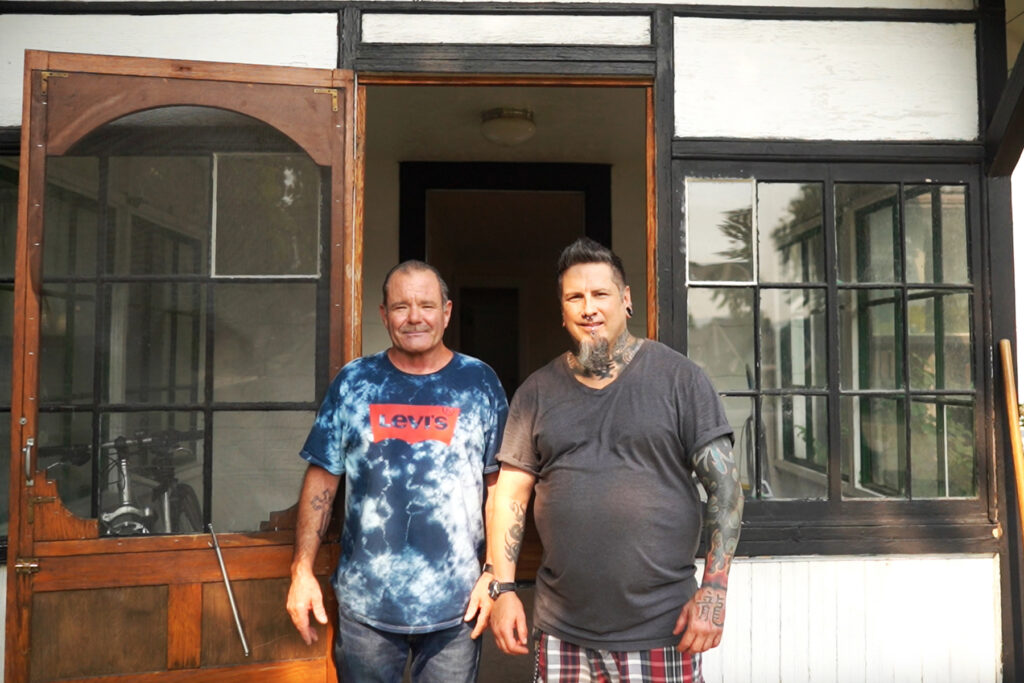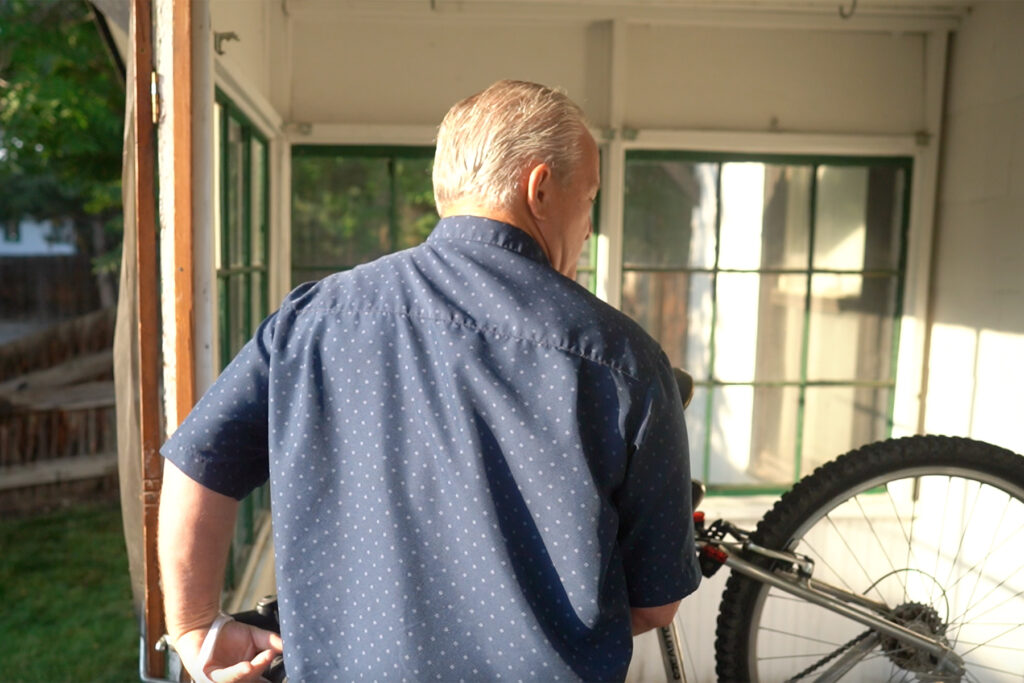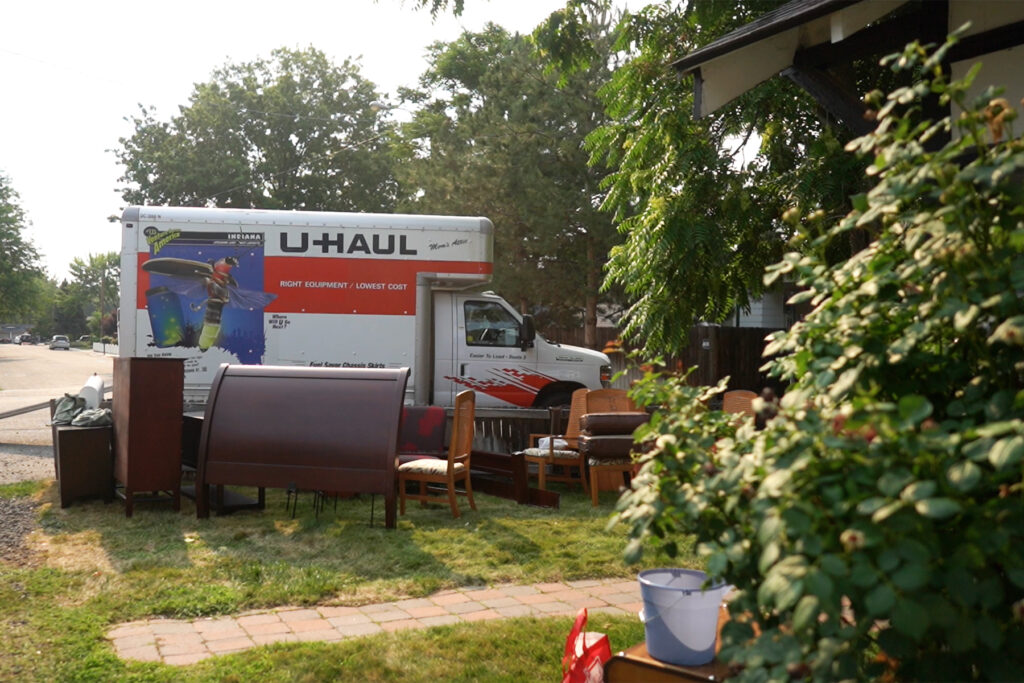
Word on the Street Issue 14, September 2021
On the morning of August 3, a black and white border collie peeks its head over a stone wall across the yard from a small, single-story house. Scott Duin and Jeff Chapman park a U-Haul truck and begin unloading the contents of their hotel rooms onto the front lawn.
Orange light reflects across the sunroom windows as they haul mattresses and a bike inside the front door. It’s early, and the neighborhood is waking up. But Duin and Chapman have been working all morning. This day has been years in the making, and they’re not wasting any time.
Known to shelter staff as Scotty and Jeff, the friends met while enrolled in Interfaith Sanctuary’s Project Recovery. Duin, who began playing drums at age 6, fell into addiction and found himself living in the parking lot at Corpus Christi house in 2019 before moving to Interfaith Sanctuary with a desire to get sober from alcohol. Chapman spent years traveling as a circus stagehand and eventually entered the program to treat a meth addiction. He has spent nearly 35 years without a place to call home.
Duin has been without a place for nearly 15 years. Together, the men stabilized and moved into the hotel program, where they stayed while searching for permanent housing. But repeated setbacks at the hands of landlords who saw prior convictions and rejected their rental applications made the task seem like an impossible mountain to climb.
Finally, a private landlord stepped in and offered a two-bedroom unit at a fair price. The lease came through, and shelter staff helped them set a move-in date. Three weeks after they’ve settled in, Duin and Chapman sit at a table in the shelter’s offices. They’ve been onboarded as full-time staff and help run Interfaith Sanctuary’s food service program. Chapman runs through his daily responsibilities, which he has memorized. He and Duin are engaged in the work. It’s challenging, but they see value in their role.

The men prepare and bring lunches to Corpus Christi House each morning. They keep meal donations from Life’s Kitchen dated and rotated, ensuring that nobody is eating anything expired, then clean and wash the refrigerators and pick up trash from the shelter’s back end, where they serve up to 150 meals each night to anyone in need. “My role is positive. People who come to that rope are grateful,” Chapman said. “They say thank you. You get a few rough ones. But you have to look at that individual who’s giving you a hard time and smile. You can’t let that get under your skin.”
Duin said, “We deal with people in all kinds of situations, but we do it with a smile and a hot meal. Most of them say thank you. They’re appreciative.”
The men clean the food trailer once a week from top to bottom. They powerwash the outdoor spaces and run security on Saturdays, all the while ensuring that morning staff has breakfast to serve on the weekends. “It’s 8 hours a day,” Duin said. “We might take a couple of cigarette breaks, but we just stay busy.”
Duin said it’s working in the food trailer that helped him back onto his feet. The job gave him purpose and a paycheck. “It allowed me to actually save money. I used to fly a sign. It was a complete 180-degree turnaround from what I was doing when I was on the street,” he said. “This is just that step higher.”

Chapman and Duin transitioned smoothly into their new home thanks to the help of the shelter community. A donor moving out of her house provided furniture, which Facility Director Buzz helped load into a moving truck and unpack at the new place. Both men said living at the Red Lion Hotel after starting part-time work through an Idaho Department of Labor grant prepared them for the responsibilities of taking care of a house, making relocating less overwhelming.
They discuss the comfort of having central AC and how nice it is to have an up-to-date washer and dryer. The friends take turns mowing the lawn, and Duin recently pruned the rose bushes. “I’m still getting used to it,” he said.
Both said their favorite part of having a house is the ability to control the environment they come home to each day, and they keep it clean.
Asked if they feel strong, both men answered, “Absolutely.”
“I’m just grateful to be sober,” Duin said. “Sometimes I can smell the alcohol coming through the window of the food trailer, and it’s just a reminder that wow, I was there once too. They just haven’t made it here yet. So I give them a hot meal and hope it will serve their purpose.”
Chapman said he would tell someone thinking about taking steps to recover, “The housing will come. Be patient and don’t rush this. It’s hard work. But I took the first step toward recovery, and everything just started to line up.”
